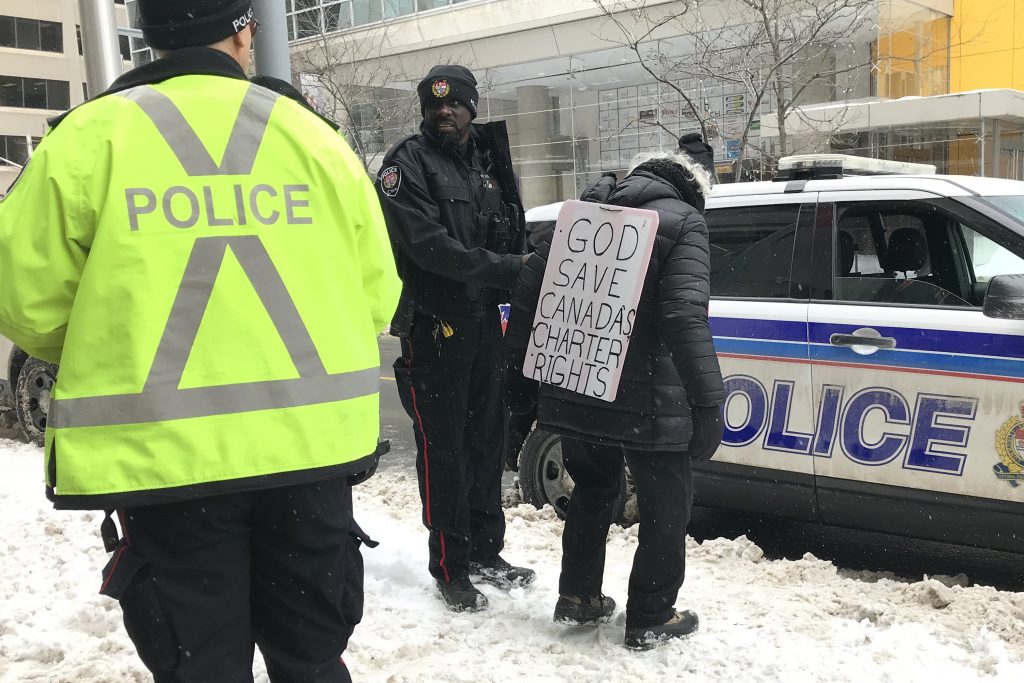‘Bubble zone’ law leads to man’s arrest
By Cora Hansen
An anti-abortion activist who swapped his graphic sandwich boards for a sign defending freedom of expression and religion — “God Save Canada’s Charter Rights” — is facing charges under a new law against anti-abortion protests outside abortion clinics.
The man was arrested twice, two days apart, outside the Morgentaler clinic on Bank Street. He said he is testing the scope of the law, and is scheduled to appear in court in March.
To ensure safe access to abortion services, the ban prohibits any individual from performing an act that directly disapproves of providing abortion services, within 50 metres of a clinic. The so-called “bubble zone” came into effect on Feb. 1.
The man was bundled into a police car by Ottawa Police at about 2 p.m. on Feb. 9. He was detained following a similar incident on Feb. 7.
“This city – this is the central seat of government, the federal seat of government is here – has got the worst erosion of all parts of Canada of our fundamental rights,” the man stated.
The man said he was not protesting abortion — something he had previously protested in front of the Bank Street clinic for six years before the law came into effect – but instead unspecified violations of Charter rights to freedom of expression and religion.
“It was an injustice for me to have been arrested and charged,” said the man.
For Martha Jackman, University of Ottawa constitutional law professor, the argument that the ban infringes on his rights is sound — but that doesn’t mean the law is unconstitutional.
“The bubble zone does limit anti-abortion protesters’ freedom of expression. But that does not make the bubble zone unconstitutional if the limits it creates are reasonably and demonstrably justifiable,” Jackman said.
Rights granted by the Charter are not absolute; when reasonable justifications are provided, they can be subject to change, she noted.
“In the case of the bubble zone, the justification is in the title of the act — the justification for the limits of the anti-choice protesters’ expression rights is to ensure women have safe access to abortion services,” Jackman said.
Johanne Brownrigg, member of the pro-life movement Campaign Life Coalition, said that the law targets her group’s movement specifically.
“When it comes to other protests, whether it’s strikes or civil disobedience for other causes, people do not have to put up with this kind of silencing and distancing from the object of their protest,” Brownrigg said.
To Jackman, though, the speech used by some anti-abortion protesters is significantly harmful to the women accessing abortion services.
“The Canadian Charter allows for limits to be placed on speech that harms others — and in the case of the speech of anti-abortion protesters, their speech is not benign. It is harmful,” Jackman said. “Their speech harms the equality and security of person rights of the women seeking abortion.”
Ontario is not the first province to put laws in place to protect people accessing abortion services. Similar bans exist in British Columbia and Quebec.
Ontario Attorney General and Ottawa Centre MPP Yasir Naqvi said that reports of violence and intimidation targeting women accessing abortion services at the Morgentaler clinic inspired the law.
For the officers enforcing the law, safety is their primary concern.
“People have the right to protest, they just have to follow the rules that are in place,” said Const. Mark Soucy of the Ottawa Police. “We’re there to ensure the safety of the protesters and the people attending the clinic.

